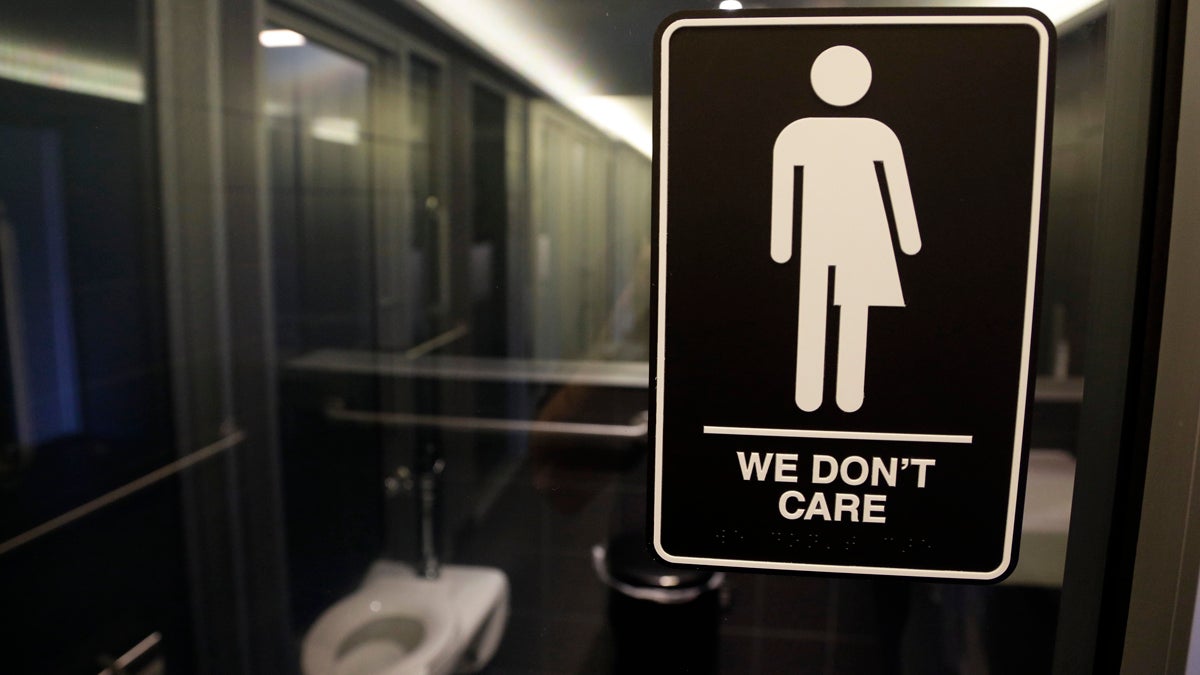GOP concerned about gender policy in Delaware schools
Republicans are voicing concerns about proposed protections for transgender students in Delaware.

In this photo taken Thursday, May 12, 2016, signage is seen outside a restroom at 21c Museum Hotel in Durham, N.C. North Carolina is in a legal battle over a state law that requires transgender people to use the public restroom matching the sex on their birth certificate. The ADA-compliant bathroom signs were designed by artist Peregrine Honig. (Gerry Broome/AP Photo)
Some legislators in Delaware are concerned about a proposed uniform anti-discrimination policy for schools.
State Rep. Ruth Briggs King, R-Georgetown, said the drafting process for a proposal that includes several protections for transgender students wasn’t transparent enough, and is calling on parents to voice their opinions.
“If I’m a man dressed as a woman going to the women’s bathroom, that’s not an overriding concern for many people,” she said. “But to think we’re going to make a requirement to do certain accommodations at a very young age at a time children are approaching adolescence and trying to learn about themselves is pushing it too far, they may not be ready, there’s not been conversations and preparedness for this, and to take the parent out of the equation is a disservice to everyone.”
In July, Gov. John Carney, D-Delaware, directed the Department of Education to draft a policy that informs staff how to address potential discrimination.
He said it would help ensure districts and charter schools have the support they need to develop consistent, meaningful policies that prohibit discrimination against students.
“I expect Delaware’s school districts to ensure that every student can attend school comfortably and without fear of discrimination – now and in the future,” Carney said at the time. “At the state level, we’re making sure that state agencies follow a consistent, anti-discrimination policy. This will help our schools move in that same direction.”
Democrats in the House supported the resolution to create a task force to draft an anti-discrimination policy, while all but two Republicans voted it down.
The Anti-Discrimination Development Team, consisting of Education Secretary Susan Bunting, school staff and parents, propose that students would be able to self-identify gender, participate on sports teams consistent with their gender identity and access locker rooms and bathrooms corresponding their gender identity.
Briggs King said biggest concern is a proposal that would allow students to use a “preferred name” without consulting parents if it’s considered in the student’s best interests.
She said she’s also against the timing of the process—prior to the senate voting on the resolution—and also doesn’t believe there was enough opportunity for public comment during the drafting process.
Briggs King said she hopes more parents will voice their opinion through December 4th, while they’re being accepted.
State Rep. Rich Collins, R-Millsboro, also expressed his concerns in a newsletter released last month, arguing the state’s nondiscrimination policy in regards to gender identity doesn’t apply to public education.
“Neither the proposed regulation nor the model policy document, are legitimate because they are not based on any legal authority granted by the General Assembly,” he wrote.
State Representative Debra Heffernan, D-Brandywine Hundred, who sponsored the resolution to create the guidelines, said in a statement, “This shouldn’t be in question: discrimination is blatantly wrong. Kids deserve to be safe in our schools, and without the fear of being bullied because of who they are or what they wear,” Heffernan said. “The Department of Education crafted this anti-discrimination policy at Governor Carney’s direction so that students can learn in an inclusive environment where they can feel safe and respected. That inclusive environment is essential for all children to learn and grow.”
WHYY is your source for fact-based, in-depth journalism and information. As a nonprofit organization, we rely on financial support from readers like you. Please give today.





